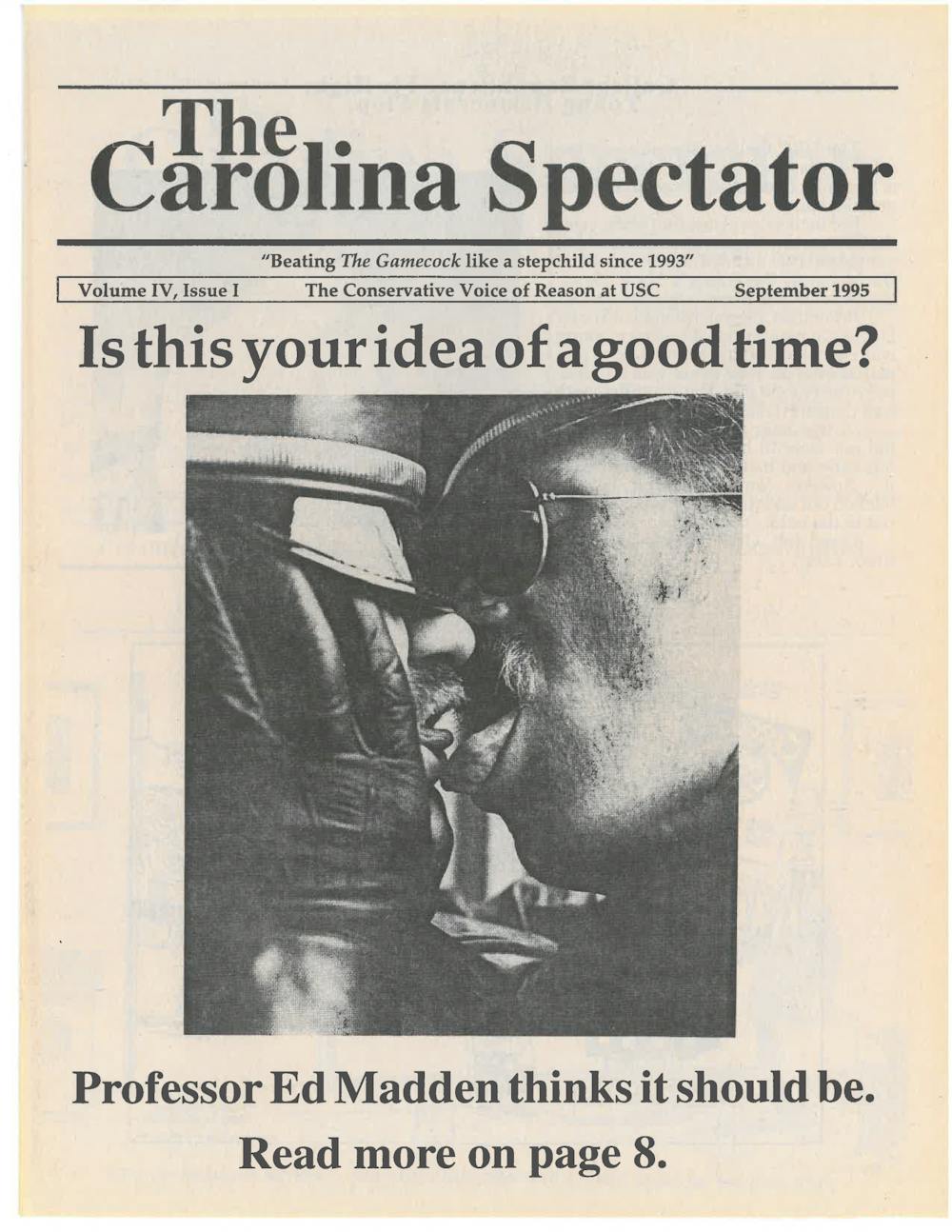In September 1995, USC students opened their university mailboxes to find a pamphlet featuring a closeup of two men clad in leather kissing.
“Is this your idea of a good time?” the pamphlet said. “Professor Ed Madden thinks it should be.”
The pamphlet was the September 1995 edition of the now-defunct Carolina Spectator, a student-run conservative newspaper that stopped publishing in December 1996.

The issue expanded on then-untenured English professor Madden’s supposed idea of a good time in editor Vernon C. Davenport’s column titled, “Homosexual professor indoctrinates students.”
Davenport claimed that Madden indoctrinated students in his Literature and AIDS and English Literature course which would have been better titled “Sodomy in British Literature,” according to the column.
At the end of the article, The Spectator published Madden’s home and office addresses and phone numbers.
“I used to walk back and forth on campus at that point,” Madden said. “To my mind, that was an open invitation to a gay bashing.”
In response, the faculty senate passed a resolution which condemned sexual orientation-based discrimination, but the board of trustees didn't follow, leaving sexual orientation out of the university’s non-discrimination policy at the time. That's changed, and now sexual orientation is included in USC's non-discrimination policy.
Almost thirty years later, a resolution passed by USC's faculty senate on April 5, 2023, would allow for free expression on campus while permitting the university to condemn what it judges as hateful speech.
"The leadership of the university, speaking for the community as a whole, may also express its disapproval of speech that violates its support for the values of diversity, inclusion, tolerance, and mutual respect expressed in the Carolinian Creed," section four of the resolution reads.
With pressure coming from state legislation designed to address critical race theory, the faculty senate has debated rules on free expression for professors on campus for three years, including discussion of the Chicago Principles, a standard of free expression from the University of Chicago. More than 90 other universities adhere to the Chicago Principles, but the faculty senate passed its own resolution on academic freedom, which addresses one of the most controversial aspects about the Chicago Principles: its neutrality.
Under the faculty senate's new resolution on free expression, USC can condemn a protest against drag shows whereas a public school that adheres to the Chicago Principles, like Clemson, cannot.
Clemson's board of trustees adopted the Chicago Principles without consulting faculty in February 2023. That move came as a result of Clemson's College Republicans denouncing a university-sponsored drag show, according to multiple faculty senators at USC.
Faculty senate chair and management professor Audrey Korsgaard said that the move at Clemson pressured USC's faculty senate to create a firm policy on free expression before the decision was made without faculty input.
"We have to hurry up and make sure we do it before somebody else makes a choice for us," Korsgaard said.
History professor and President of the American Association of University Professors Carol Harrison said she believes circumstances such as Madden's leak should warrant a statement from USC since the school is not a neutral body. Under the faculty senate's new resolution, USC may be able to do so.
"Universities have values," Harrison said. "The Carolinian Creed is a set of values that the university has espoused — it's right at the front of the faculty manual."
Psychology professor Scott Decker was one senator who proposed that USC adopt Chicago Principles after witnessing other faculty members lose their jobs and seeing a more hostile environment to free expression on social media.
"By adopting them, the university is saying, 'We want the maximal amount of academic freedom for our faculty,'" Decker said. "'We stand behind that.'"
Despite Clemson's board not talking to faculty about adopting the Chicago Principles, Korsgaard and Clemson's AAUP President and architecture professor Peter Laurence have both said they have not heard any complaints from Clemson faculty about its policy on free expression.
Madden is grateful that faculty senate stepped ahead of the decision and took a stance on the issue.
"I just think it is important that we passed principles that we believe in," Madden said. "Not be — I hate to use the word forced — but forced, like Clemson was, to fall under the umbrella of principles we didn't write and we were not consulted over."
However, Korsgaard thinks it's ironic to have faculty lead policy on free expression.
"Truthfully, the faculty are not the issue here," Korsgaard said. "It's speakers who come to campus, and it's usually students who mobilize."

